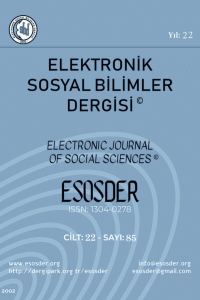Öz
In this article, the place and virtues of morality in Plato's idealist philosophy are discussed. In the context of moral philosophy, it has been tried to reveal what the principles of moral behavior are within the framework of Plato's system. The claim that the telos/purpose of moral action is happiness has been emphasized in Plato. The source of morality, which is based on happiness, is to reach the best (idea of good). Since Plato examines morality on the basis of knowledge, first of all, the distinction of episteme from doxa has been discussed. Later, the relationship that Plato established between God and morality was examined based on the Euthyphro dilemma. As in other areas of moral thought, Plato both divides the soul into parts and defines the virtues corresponding to the perfection of each soul. In each part of the study, the individual and social aspects of Plato's moral thought were examined and a general picture was depicted by associating the types of virtue with the parts of the soul. The aim of this study is to describe Plato's moral theory, which formed the basis of moral studies after him, within the framework of regular connections by making use of Plato's moral works. In this study, after Plato discussed that virtues are something that can be taught, it is concluded that all the virtues, which are considered singular, should be considered as a single virtue.
Kaynakça
- Akarsu, B. (1982). Ahlak öğretileri: Mutluluk ahlâkı, Remzi.
- Ann, J. (2019). Plato’s Ethics. G. Fail (ed) içinde, The oxford handbook of Plato (ss.530-549). Oxford University.
- Cömert, B. (2013). Estetik. De Ki.
- Gökalp, N. (2010). Duygu ve Etik. Ebabil.
- MacIntyre, A. (2001). Homerik çağdan yirminci yüzyıla ethik'in kısa tarihi (H. Hünler ve S. Z., Hünler, Çev.). Paradigma.
- Platon. (1986a). Kharmides (T. Gökçöl, Çev.). M. Bayka (ed) içinde, Diyaloglar 2, (ss. 25-58). Remzi.
- Platon. (1986b). Kratylos (T. Aktürel, Çev.). M. Bayka (ed) içinde, Diyaloglar 2 (ss. 189-260). Remzi.
Öz
Bu makalede Platon’un idealist felsefesinde ahlakın tuttuğu yer ve erdemler ele alınmıştır. Ahlak felsefesi bağlamında Platon’un sistemi çerçevesinde ahlaki davranışın ilkelerinin neler olduğu ortaya konmaya çalışılmıştır. Platon’da ahlaki eylemin telosu/amacının mutluluk olduğu iddiası üzerinde durulmuştur. Mutluluk temelli olan ahlak anlayışının kaynağı, en iyi olana ulaşmaktır. Platon ahlak konusunu bilgi temelli incelediği için öncelikle epistemenin, doksadan ayrımı tartışma konusu edilmiştir. Daha sonra Platon’un Tanrı ve ahlak arasında kurduğu ilişki Euthyphron ikileminden hareketle incelenmiştir. Platon, ahlak düşüncesinde diğer alanlarda olduğu gibi hem ruhu bölümlere ayırır hem de her bir ruhun kemal sıfatına denk düşen erdemleri tanımlar. Çalışmanın her bir bölümünde Platon’un ahlak düşüncesinin bireysel ve toplumsal yönleri incelenmiş ve erdem çeşitleri ruhun bölümleri ile ilişkilendirilerek genel bir tablo resmedilmiştir. Bu çalışmanın amacı, kendinden sonra yapılan ahlak çalışmalarına temel teşkil eden Platon’un ahlak teorisinin, Platon’un ahlakla ilgili eserlerinden faydalanılarak düzenli bağlantılar çerçevesinde betimlenmesidir. Bu çalışmada Platon’un erdemlerin öğretilebilir bir şey olduğunu tartıştıktan sonra tekil olarak ele alınan bütün erdemlerin tek bir erdem halinde düşünülmesi gerektiği sonucuna varılmıştır.
Kaynakça
- Akarsu, B. (1982). Ahlak öğretileri: Mutluluk ahlâkı, Remzi.
- Ann, J. (2019). Plato’s Ethics. G. Fail (ed) içinde, The oxford handbook of Plato (ss.530-549). Oxford University.
- Cömert, B. (2013). Estetik. De Ki.
- Gökalp, N. (2010). Duygu ve Etik. Ebabil.
- MacIntyre, A. (2001). Homerik çağdan yirminci yüzyıla ethik'in kısa tarihi (H. Hünler ve S. Z., Hünler, Çev.). Paradigma.
- Platon. (1986a). Kharmides (T. Gökçöl, Çev.). M. Bayka (ed) içinde, Diyaloglar 2, (ss. 25-58). Remzi.
- Platon. (1986b). Kratylos (T. Aktürel, Çev.). M. Bayka (ed) içinde, Diyaloglar 2 (ss. 189-260). Remzi.
Ayrıntılar
| Birincil Dil | Türkçe |
|---|---|
| Konular | Sosyoloji |
| Bölüm | Makaleler |
| Yazarlar | |
| Erken Görünüm Tarihi | 27 Ocak 2023 |
| Yayımlanma Tarihi | 27 Ocak 2023 |
| Gönderilme Tarihi | 15 Kasım 2022 |
| Yayımlandığı Sayı | Yıl 2023 Cilt: 22 Sayı: 85 |
Elektronik Sosyal Bilimler Dergisi (Electronic Journal of Social Sciences), Creative Commons Atıf-GayriTicari 4.0 Uluslararası Lisansı ile lisanslanmıştır.
ESBD Elektronik Sosyal Bilimler Dergisi (Electronic Journal of Social Sciences), Türk Patent ve Marka Kurumu tarafından tescil edilmiştir. Marka No:2011/119849.


